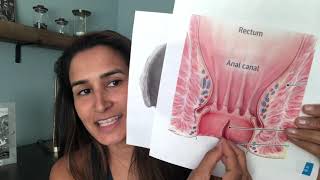Saturday, 17 January, 2026г.
















Где искать: по сайтам Запорожской области, статьи, видео ролики
пример: покупка автомобиля в Запорожье
Tight muscles and Anal fissures
DISCLAIMER: This video is no substitute for in-person treatment and is for demonstration purposes only. If you suffer from any physical condition and illness, please consult your doctor before receiving any form of treatment.
Many of our patients suffer from Anal Fissures, which are small tears in the tissue that lines the anus. Tension in the muscles of the pelvic floor can affect anal fissures, both in terms of causing them and making them difficult to heal.
What is an anal fissure?
A fissure is a cut or tear in the anal sphincter. Most people with an anal fissure have sharp pain with a bowel movement and/or bright red blood with a bowel movement. The cut/tear causes the bleeding, and the pressure from the bowel movement causes pain.
It can be hard for an anal fissure to heal. Sometimes the fissure starts to heal, but the pressure from a bowel movement can open the wound back up again.
To treat an anal fissure, often your colorectal doctor will give you a suppository to help soothe the muscles to allow you to have a bowel movement. Often what we see is that patients find temporary relief, and then the fissure come back.
Pelvic Floor Tightness and Anal Fissures
Often people have tight musculature in and around their pelvic floor muscles as well as in and around the sphincter.
When the pelvic floor muscles become really tight, they can make the sphincter tight also. When the sphincter is too tight, it makes the hole tighter and smaller. If those muscles are not flexible enough to allow stool to pass, it will increase the pressure on the walls of the sphincter during a bowel movement.
Additionally, muscle tension in the sphincter can cause pain and poor blood flow, which means the muscles don’t get all the nutrients they need from good blood flow. This can affect the tissue, healing and clearing out toxicities in the musculature.
Tension in the pelvic floor can cause fissures to develop. In addition to the fissure, if you have tightness in these muscles, it could be contributing to the reoccurrence of the fissure.
Anal Fissure Treatment
In order to allow the fissure to heal, it’s important to break the cycle of tension. In addition to the recommendations of your colorectal doctor, a pelvic floor physical therapist can help improve the health of these muscles to prevent the fissure from reoccurring.
For more visit us at www.rebalancept.com.
Copyright All Rights Reserved 2019 Rebalance Physical Therapy
Теги:
anal fissure pelvic floor dysfunction anal fissure treatment chronic anal fissure pelvic floor treatment
Похожие видео
Мой аккаунт


 У вашего броузера проблема в совместимости с HTML5
У вашего броузера проблема в совместимости с HTML5


